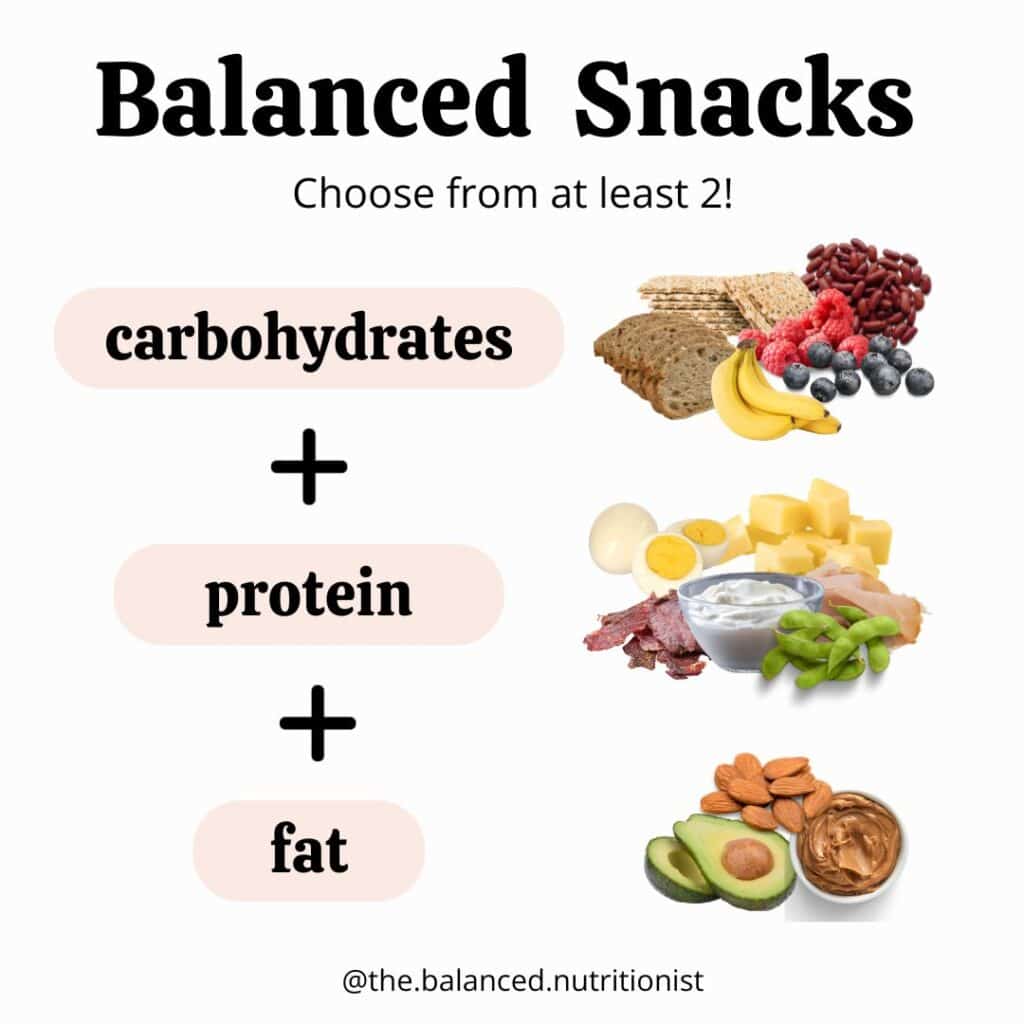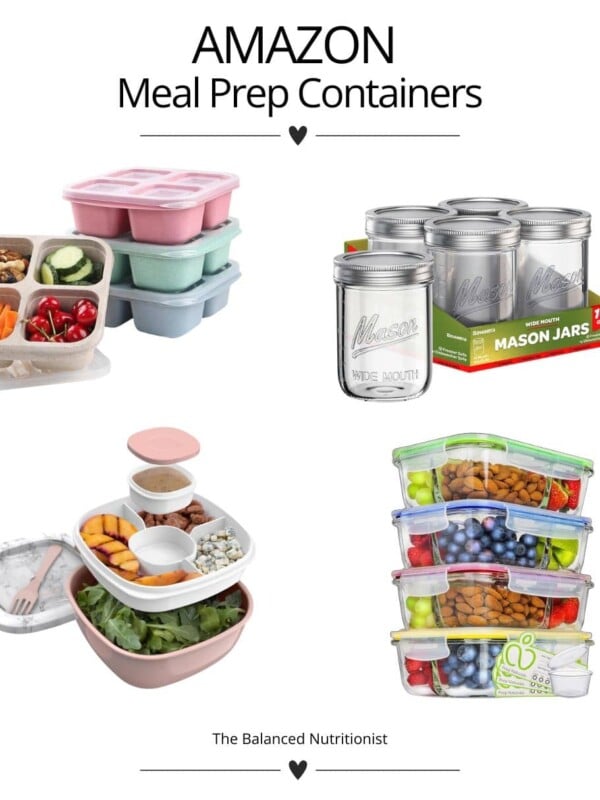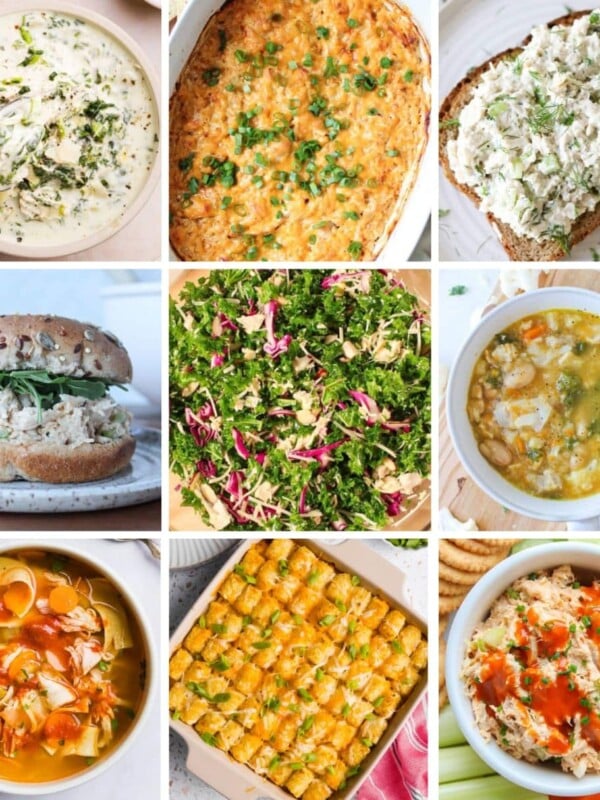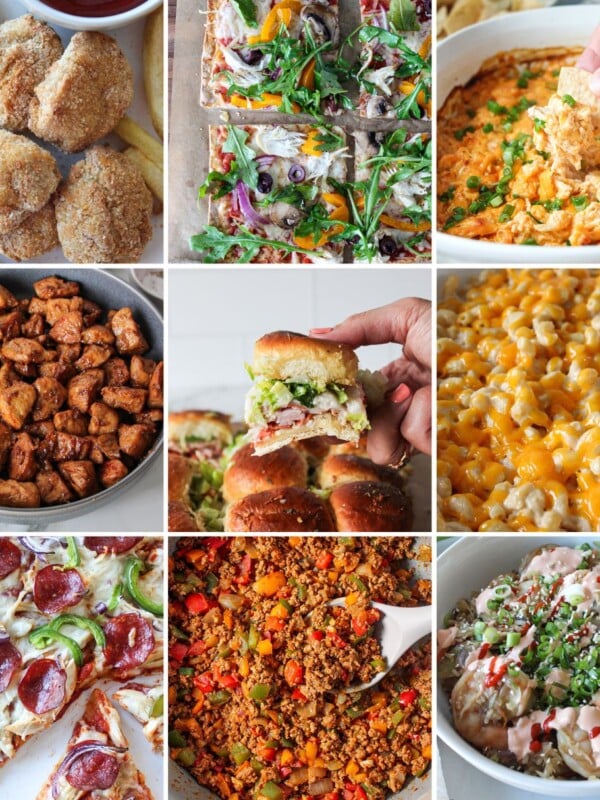This post may contain affiliate links. Please read our disclosure policy.
Do you feel like you’re constantly reaching for unhealthy snacks and only want “junk food”? Have you been trying on your own to figure out how to stop snacking?
Or…you choose the healthier option and make yourself a snack of fruits and veggies…but are hungry just moments later and are disappointed to end up in the pantry for more.
I’m here to help! I’m Jamie, a Registered Dietitian with almost a decade of experience navigating healthy eating and helping you feel empowered and happy around food.
If you can’t stop snacking, this blog post is for you.
Let’s kick things off with a little discussion about if snacking should go…and whether snacking is okay.

Table of Contents
- Why you’re snacking so much
- Is snacking bad?
- 1. Eat regularly spaced, balanced meals
- 2. Prioritize protein at meals
- 3. Focus on fiber
- 4. Don’t fear fat
- 5. Eat when you’re hungry, not starving
- 6. Practice mindful eating
- 7. Get quality sleep
- 8. Manage your stress
- 9. Stay hydrated
- 10. Enjoy balanced snacks
- That’s a (snack) wrap!
- You Might Also Like:
Why you’re snacking so much
If you can’t step away from the snacks and you’re feeling a bit out of control, it’s helpful to understand why it’s happening. Here are the most common reasons it tends to happen:
- You’re not eating enough. Your portions might too small, you might be skipping meals, or maybe you’re choosing foods that are way too low calorie in an attempt to be healthy. When you don’t eat enough for your needs, you end up with major cravings.
- You’re missing something nutritionally. You need a balance of protein, carbohydrates and fat to feel full and satisfied. You need fiber, too! Without that balance, you’ll likely snack more as your body tries to fill that nutrition need.
- Your relationship with food needs work. If you’ve spent a long time trying to eat less, snack less, diet, etc etc.. snacks probably feel a bit off limits. When food feels off limits, we tend to feel even more out of control with it (I know, frustrating).
Don’t worry, we’re going to cover exactly how to fix these things with practical tips, so keep reading!
Is snacking bad?
Snacking can often feel like it’s nothing but “extra calories” that are going to cause weight gain, but that’s not always the case!
This may surprise you, but I’m not here to tell you that you should stop snacking or that snacking is a bad thing. In fact, snacks can actually be useful for feeling more in control around food.
Learning how to be a better, more in control snacker can make a serious impact on your eating habits.
With that said, let’s get right into the best ways to get you feeling in control with your snacking habits.

1. Eat regularly spaced, balanced meals
The first place to start is to eat at regular intervals throughout the day– at least every 4-5 hours is a good idea. And, no skipping!
This helps keep your hunger cues and fullness cues a lot more stable, which means you’re more likely to stop eating when you’re full. Grazing fuels grazing.
Make sure your meals and snacks are nutritionally balanced so they can provide energy and nutrients for your body. This means protein, fat, and carbs at most meals and snacks.
By giving your body the fuel it needs throughout the day, you won’t feel so snacky and out of control at the end of the day. Your mood and energy levels will benefit too!
Remember, it’s not all about eating the “healthiest” version of everything, all the time. Don’t forget to include your favorite foods! If your meals aren’t satisfying, you’re more likely to start reaching for foods mindlessly.
2. Prioritize protein at meals
Protein is the most satiating nutrient, so it helps you stay full longer. It’s a good idea to include sources of protein at most meals like meat, fish, eggs, Greek yogurt, cottage cheese or tofu.
You definitely don’t need to be 100% perfect all the time, but having protein-rich food at most meals helps to keep your blood sugar, mood, and energy stable for longer.
When you’re not eating enough protein, it’s very common to feel super snacky in between meals. Here are a few of my favorite high protein meals and snacks:
- High Protein Pasta Salad
- Buffalo Chicken Salad
- Chocolate Chip Greek Yogurt Cookie Dough Dip
- Cottage Cheese Queso Dip (High Protein!)
- Crustless Egg White Quiche with Spinach & Feta
3. Focus on fiber
Did you know that most adults don’t eat their recommended amount of daily fiber?
Women should aim for at least 25g of fiber per day, and men should aim for at least 38g.
Fiber has a ton of health benefits, but one of the most important for our conversation about snacks is that fiber helps keep you full and stabilizes your blood sugar levels.
When your blood sugar levels are stable, you have less cravings for unnecessary snacks.
Fiber sources include whole grains, fruit, vegetables, beans, and nuts and seeds.
Eating more fiber does not need to mean plate after plate of raw veggies or giant salads if that’s not your thing.
You can bump up your fiber by adding more fruits and veggies to the meals you’re already eating, opting for high fiber bread and high fiber cereal, choosing whole grain noodles or legume-based pasta, or trying new high fiber recipes, like these:
- High Fiber Berry Smoothie
- Maple Brown Sugar Overnight Oats
- Easy 4 Ingredient Chickpea Pasta Salad
- Brussel Sprout Pasta Salad Bowl

4. Don’t fear fat
Fat is another nutrient that can help you feel fuller for longer. Healthy fats like olive oil, nuts and nut butter, seeds, and avocado are great fat source that will help your meals keep you full.
It was once thought that opting out of fat was the healthier choice, but that’s definitely not the case. Fat is even important for the absorption of certain vitamins.
Meals that are too low in fat don’t keep you as full and as a result you guessed it, can lead to more snack cravings.
5. Eat when you’re hungry, not starving
Have you ever waited way too long to eat and then found yourself grabbing snack after snack out of your pantry?
Or gone to the grocery store starving?
The bottom line: when you wait until you’re starving to eat, it can be harder to make balanced choices that align with your health goals.
It’s best practice to eat when you’re feeling hungry but not so hungry that you can’t think straight enough to make a mindful decision.
This brings us back to tip #1, make sure you’re eating consistent, balanced meals and snacks so that you avoid the out of control feeling of being too hungry.
When you eat before you’re absolutely ravenous, your snack cravings will go down.
6. Practice mindful eating
If you’re eating in front of the TV, scroll on IG or Tiktok, or eating a handful of random foods while you’re doing things around your house, you’re probably doing a lot of mindless snacking.
You can become a more mindful eater by putting just a little bit of focus back into your food.
Next time, try slowing down when you’re eating, making sure your attention is mostly on your food, noticing if you are still hungry or full after each bite, and avoiding distractions (like scrolling on social media).
Mindless eating can fuel overeating and make excessive snacking worse.
Important note: this is our real life, so it isn’t reasonable to expect to eat every single meal away from a screen, but when you can slow down and enjoy a meal with fewer distractions, enjoy the opportunity.

7. Get quality sleep
Did you know that when you don’t get enough sleep, you’re hungrier the next day?
Poor sleep actually affects our hunger and fullness hormones, ghrelin and leptin.
Ghrelin lets us know when we’re hungry and leptin lets us know we’re feeling satisfied. When we don’t get enough sleep our ghrelin actually goes up, and our leptin goes down– aka you’re hungrier and less satisfied.
Sleep deprivation can even make your body crave carbs. To feel your best self, aim for 7-8 (or more!) hours of sleep each night.
When you’re more rested, your body is in a better place to make decisions about food, including snacks.
8. Manage your stress
Surely this is no surprise, but stress eating is real. When you’re stressed out it’s much more difficult to make healthy choices because so much of your headspace is being used up already.
Have you ever noticed how much harder it is to make healthier choices after a stressful, busy day at work?
For most people, stress eating (aka emotional eating) probably won’t disappear entirely, but if it’s out of control– it’s a good place to put some focus.
There’s nothing wrong with reaching for food for comfort sometimes, I just recommend that this not be your only tool to manage stress.
Consider other ways to manage and process stress and take care of your emotional needs such as exercise, calling a friend, reading, meditation, therapy, journaling, or whatever your favorite stress-relieving activity is.
9. Stay hydrated
It’s a common misconception that you might feel hungry when you’re really thirsty, but being adequately hydrated is still important.
Did you know that even mild dehydration can impair energy levels and mood? We’re more likely to make mindful food choices when we’re feeling our best, and that includes being adequately hydrated.
Some research also suggests that increased water intake may help with weight loss because it promotes feeling of satiety. This doesn’t mean you should use water to feel full, but just something to note about hydration!
The bottom line: staying hydrated is important for feeling best, and when we feel best, we tend to make more mindful food choices!

10. Enjoy balanced snacks
Snacks are not off-limits, and trying to stop snacking altogether will probably leave you frustrated.
In fact, eating well-timed, nutritious snacks can be a total game changer for feeling in control around food throughout the day.
To optimize your snacks and help them actually keep you full in between meals, try pairing a high fiber carbohydrate with either a protein or fat source.
For example: some whole grain crackers (high fiber carb) with sliced cheese (protein and fat), or a Greek yogurt (protein) with some berries (high fiber carb).
And PS– if you’re craving something like potato chips or ice cream, it doesn’t mean it’s off limits. Work on making mindful, healthful decisions whenever possible, and then practice moving on when it doesn’t happen perfectly.
Nutritious foods are important, but so is your relationship with food. Allowing yourself to enjoy all foods without guilt is a part of managing cravings and feeling in control around food.

That’s a (snack) wrap!
Snacking is neither good nor bad – it’s how you approach it that matters most. If you’re ready to feel in control of your snacking habits, try implementing some of these tips so that you can snack when you want in a way that feels good.
Building any new habit takes time, so give these tips practice!
And when you need a step-by-step guide on how to actually improve your eating habits (and to stop dieting), check out The Balanced Basics Handbook so that you can understand protein, carbs, and fat without obsessing over them and put together balanced, satisfying meals using a simple, flexible method.
You Might Also Like:
Navigating Food Freedom When You Have Weight Loss Goals
Balanced Snacks to Fuel your Health Goals














I love how you address the importance of not skipping meals and keeping a regular eating schedule. It’s something I’ve been guilty of, which probably explains my snack cravings. Thanks for the balanced approach and for reminding us to include our favorite foods too!
Regards,
Raquel Britzke